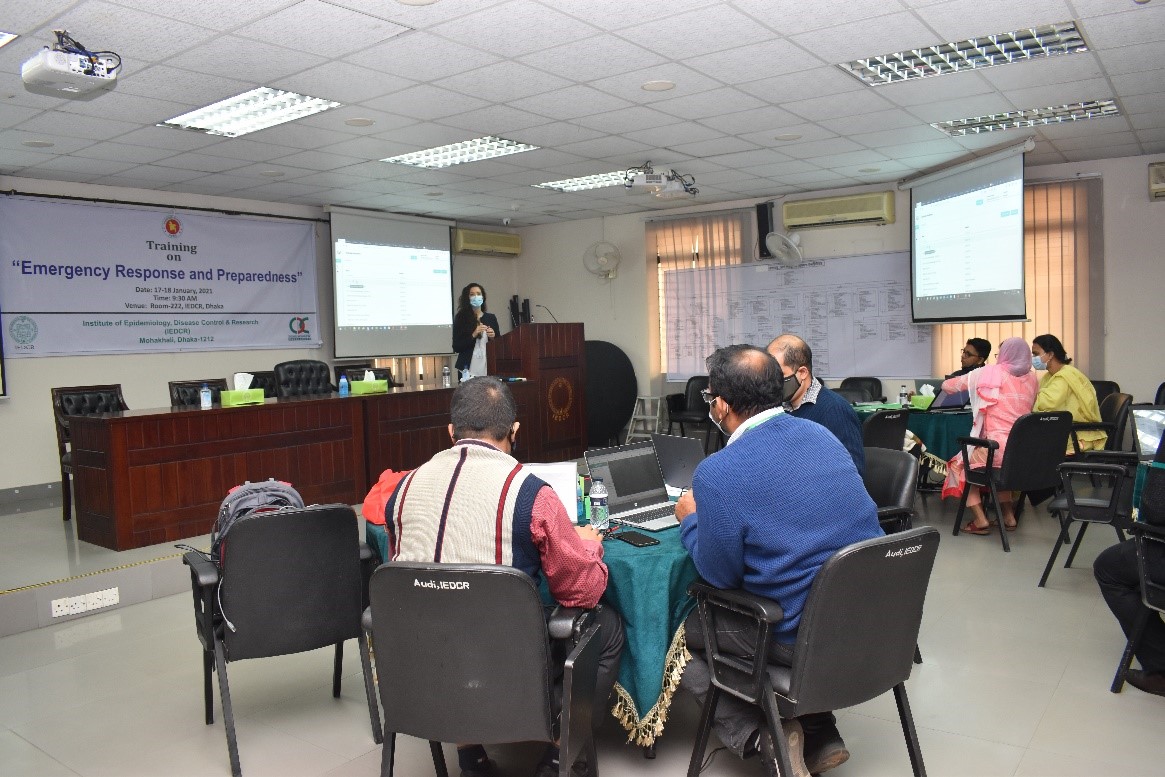The spread of COVID-19 has been an unprecedented challenge for Bangladesh as well as for the rest of the world, and it has placed enormous strain on many health systems, regardless of geography and income level. The SARS-CoV-2 virus, which causes COVID-19, spreads very quickly between people, mainly when an infected person is in close contact with another person. The closer people are for long periods of time, the higher are the risks of transmission, especially in indoor locations, where there is poor or no ventilation.
Adopting basic preventive measures like mask-wearing, distancing, and handwashing significantly reduces the chances of transmission. In addition, an essential public health tool for controlling infectious disease outbreaks is systematic contact tracing, as it allows to quickly identify people who have been exposed to a disease. It permits breaking the chains of transmission by investigating who they may have been in contact with and following up with these contacts to prevent the onward spread to even more people. The goal is to stop the transmission of the virus by reducing the number of people who are circulating with it.
Especially in a context like the COVID-19 pandemic, such an endeavor can present many challenges. Trained contact tracers who are rapidly collecting information on thousands of cases and their contacts often struggle to share data effectively and connect the dots where information may overlap, such as cases and contacts travelling across regions. They need to have access to shared, integrated, accurate and up-to-date data. Daily access to this information must be possible and ensured so that contact tracers and decision-makers can continuously monitor the disease spread on various levels and take appropriate actions in a dynamically changing environment. It is also of the utmost importance that data are securely and reliably stored to protect privacy concerns.
.jpg?Status=Master&sfvrsn=5c79b390_19) Contact tracing training at IEDCR premises in Dhaka - WHO Bangladesh/Angelina Halder
Contact tracing training at IEDCR premises in Dhaka - WHO Bangladesh/Angelina Halder
To address these challenges, in June 2020, the Institute of Epidemiology, Disease Control and Research (IEDCR), the leading national institute for the formulation, promotion and conduction of surveillance, outbreak investigation and research on current, emerging or unknown infectious diseases in Bangladesh, with funding and technical support of WHO, recruited over 80 human resources for strengthening COVID-19 surveillance and contact tracing. After an initial phase of widespread training and scaleup of the national contact tracing workforce, the Go.Data tool was adopted and implemented at IEDCR to further enhance outbreak investigation and contact tracing activities.
Go.Data is a software tool for outbreak response and contact tracing, developed by WHO in collaboration with partners in the Global Outbreak Alert and Response Network (GOARN). By integrating relevant case and contact data, including laboratories, hospitals and other variables collected through IEDCR investigation forms, Go.Data generates daily contact follow-up lists and offers a comprehensive visualization of chains of transmission of COVID-19 in Bangladesh, down to District and Upazila levels.
Following a first phase of recruiting over 80 personnel, including medical doctors, data managers and data collectors, the IEDCR, supported by WHO, conducted intensive training sessions. 2460 government health staff of districts and sub-districts, including 20 IEDCR officials, were trained on contact tracing, isolation, and quarantine. Subsequently, the trainees were deployed to carry out contact tracing and reporting through Go.Data.
 Contact tracing training at IEDCR premises in Dhaka - WHO Bangladesh/Angelina Halder
Contact tracing training at IEDCR premises in Dhaka - WHO Bangladesh/Angelina Halder
The activities and their outputs stressed the need for more human resources dedicated to contact tracing, especially in the current pandemic phase, when there is a decrease of cases, and contact tracing is of the utmost importance to keep the transmission low.
"Go.Data has already proved to be a useful tool during this pandemic for Bangladesh's response teams, but it can be helpful even beyond COVID-19", stated Sara Hollis, Epidemiologist, Emergency Event Response, WHO. "Every year, governments across many countries need to respond to several new or recurrent outbreaks, sometimes with limited resources, and almost always without advanced notice of what is coming. We are confident that deploying Go.Data will be a gamechanger to adequately prepare now for future outbreaks. If the tools and systems for contact tracing are already in place, you can act quickly and decisively as soon as the signal is flared. "
Go.Data is freely available for any country or institution to use; it is a simple and flexible tool that can be deployed quickly and easily, especially in emergency and pandemic contexts. It provides real-time and complete outbreak investigation data in an intuitive visual form. Thus, it enhances field-level operations and decision-making, as it clearly points out where and how to better direct resources.
"WHO has constantly supported the government and people of Bangladesh in their outstanding efforts to respond to the COVID-19 pandemic", said Dr Bardan Jung Rana, WHO Country Representative in Bangladesh. "We are committed to keep doing so with all future disease outbreaks and health emergencies. Particularly in these difficult circumstances, we must ensure that equitable access to health services is available to all and no one is left behind."
.jpg?Status=Master&sfvrsn=807e1bcd_15) Contact tracing training at IEDCR premises in Dhaka - WHO Bangladesh/Angelina Halder
Contact tracing training at IEDCR premises in Dhaka - WHO Bangladesh/Angelina Halder
